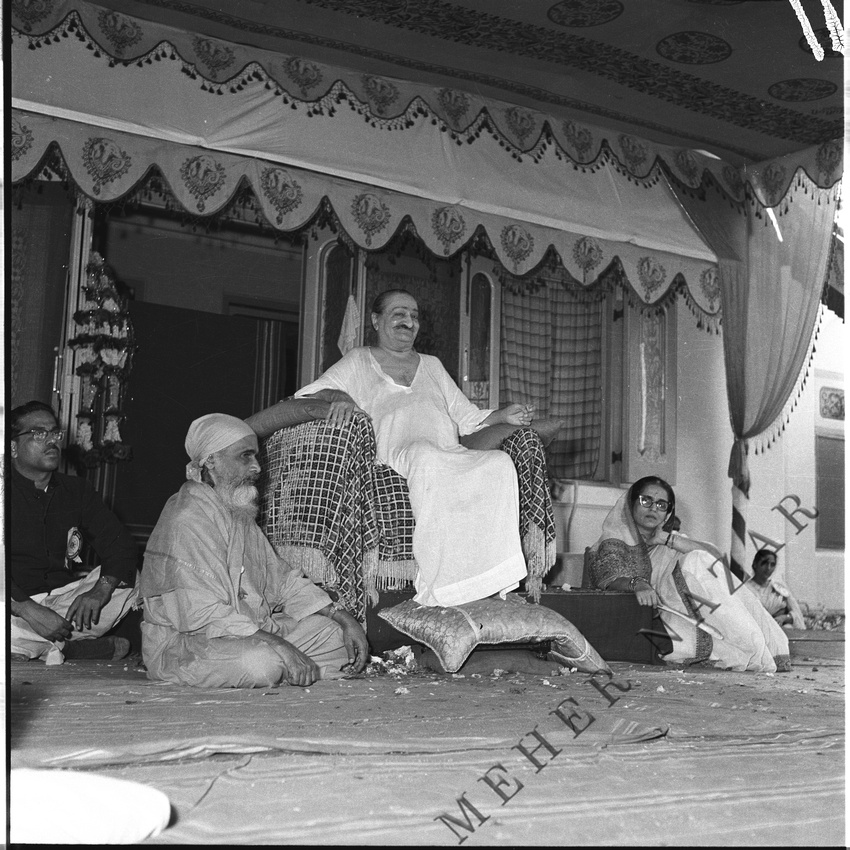Swami Shuddhanand Bharti

A yogi from Pondicherry named Shuddhanand Bharati, 56, came to Dhanapathy’s for Baba’s darshan. Many years before, Bharati had met Sai Baba, who had given him a candy, saying, “Your Beloved will possess you soon. Keep silent and centered on the Self. Sweet [blessed] is the heart which is linked with the Sweetest [God].”
Upasni Maharaj had once told Shuddhanand, “The Beloved of your life will one day embrace you.” And a high saint of Hubli had said, “You will meet a silent Master.” Now, after meeting other spiritually illumined beings such as Ramana Maharshi and Aurobindo, at last he faced Meher Baba, and immediately recognized him as “the Saint of saints, the Mahatma of mahatmas, the goal of my long pilgrimage.”
Baba met him very lovingly, and Shuddhanand Bharati bowed his head at Baba’s feet. Baba gave him a message titled “Inner Humility Is Strength, Outer Humility Is Weakness.”
While the little girls were dancing before Baba, he stated: “The first Song I sang, the first Dance I danced have eternally bound me. In spite of my best efforts, I am unable to free myself.
[LM Page 3250]
Yogi Bharati invited Baba to accompany him to Switzerland, and Baba told him to write him about it later and he would consider the request.
Baba was about to go back to his bungalow for lunch when Shuddhananda Bharati asked if he could sit in Baba’s room and meditate for a while. Baba permitted him to sit in the room where he would converse with the mandali.
After his meditation, the yogi told Nilu, “Baba is a very great saint.”
“Meher Baba is not a saint,” Nilu corrected him. “He is above all saints!”
“What spiritual practices does Meher Baba do?” Bharati inquired.
“There is no need for him to do any sadhana.”
“What do you mean?”
Nilu explained, “Meher Baba is the source of all knowledge. There is nothing for him to achieve or know, as all knowledge flows from him. Seekers do sadhana, not the One who is Realized.” Bharati was offered milk and fruit, and left at 2:15 P.M.
One of the delegates to the conference was G. S. N. Moorty. While studying for his PhD in philosophy in Calcutta, Moorty had met Dr. Deshmukh who encouraged him to have Baba’s darshan. When Moorty heard that Bharati was going to Dehra Dun to meet Baba, he asked if he could accompany him. Bharati had no objection, but Kishan Singh warned him that Baba had told him only to bring Bharati.
[LM Page 3309]
Bharati participated in the 1958 Sahavas gathering at Meherabad. He was warmly received by Baba, who embraced him and allowed him to sit near him during the gathering. This event highlighted the spiritual bond between them
[LM Page 4292]
Before leaving the pandal, Baba embraced Shuddhanand Bharati. Baba sat in his lift-chair and he was carried to the car by Meherjee, Pesi and two other men. As Baba entered the car, Prakash Chhabra, who had filmed throughout the day, took some final parting shots. At 6:00 P.M., amidst loud, shouts of his Jai, Baba was driven back to Meherazad with Kumar, Kaka, Eruch and the driver.
[LM Page 4333]
During this significant event, (East West Gathering 1962) Bharati attended Meher Baba’s darshan program. Special arrangements were made to accommodate his dietary preferences, reflecting the respect Baba had for him as a yogi. Baba’s personal care and humor in their interactions underscored their close connection
[LM Page 4864]

Kavi Yogi Maharishi Dr. Shuddhananda Bharati (11 May 1897 – 7 March 1990) was an Indian philosopher and poet. His teachings are focused mainly on the search for God in Self, through the Sama Yoga practice he created.
Biography
Bharati was born in Sivaganga in South India, and attained Jeeva Samadhi in nearby Sholapuram. He spent 25 years in silence in Pondicherry from 1925 to 1950, in the Ashram of Sri Aurobindo and the Mother Mirra Alfassa. From the early 1950s to the 1970s, he lived in today’s Yogi Gardens, beside the IIT near Adyar, Chennai. Bharati always lived alone, without an Ashram. He founded Shuddhananda Bharati Desiya Vidyalayam High School in 1979.
Works
Bharati wrote over 250 published works: 173 in Tamil, fifty in English, ten in French, four in Hindi and three in Telugu. He was also conversational in Sanskrit, Kannada, Malayalam and Urdu.[2] He is the first translator to have done both verse and prose renderings of the Tirukkural into English.[3] He also translated the novels of Victor Hugo, the plays of Moliere and Racine, and Dante’s Divine Comedy into Tamil.
In his magnum opus Bharata Shakti, Bharati describes his ideal of “One humanity living in communion with a single God in a world transformed”. The full work includes epic texts, lyrical dramas, operas, comedies, pastoral novels, news, biographies, comments on illustrated works, essays, poems in French corrected directly by the Mother, Sacred Odes, walks, Rondels and triplets. For this work, Bharati received the Raja Rajan Award from the Tamil University in Tanjore in 1984, conferring upon him the title of Doctor of Literature.
His autobiography, The Pilgrim Soul includes encounters with well-known personalities of the past century, including Annie Besant, Sri Aurobindo, Meher Baba, Shirdi Sai Baba, V. V. S. Aiyar, Sringeri Sharada Peetham, Ramana Maharshi, C. V. Raman, Subramanya Bharathi, Sivananda, Romain Rolland, Jean Herbert and others.
[Source]

Please feel free to contact us for any corrections/omissions

